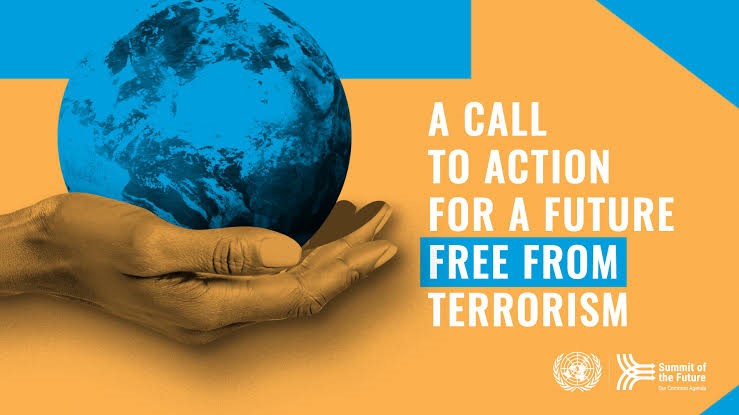THE DECLINE OF GLOBAL UNITY IN COMBATING TERRORISM
THE DECLINE OF GLOBAL UNITY IN COMBATING TERRORISM
Syllabus:
GS-2:
- Internal security
- Terrorism and response
Why in the News?
- The Pahalgam terror attack of April 22, 2025, has reignited debates on the fractured global approach to terrorism, especially state-sponsored acts from Pakistan.
- Despite condemnation, the international response remains inconsistent and fragmented, underscoring how India’s fight against terror is increasingly isolated and politicised in global diplomatic forums.
GLOBAL RESPONSE DEEPLY DIVIDED
- Muted Condemnations: Global powers issued mild statements, urging restraint instead of decisively blaming Pakistan, showcasing diplomatic balancing over strong anti-terror commitments.
- False Equivalence: Countries like the U.S. called for “both sides” to de-escalate, ignoring India’s role as a victim and Pakistan’s as a perpetrator.
- Diplomatic Hypocrisy: Nations show zero tolerance for terrorism in the West but dilute responses when it comes to terror in South Asia, especially against Indian targets.
- Selective Sympathy: The EU and Russia advocated political solutions over action, highlighting the world’s preference for status quo over accountability in South Asia.
- UNSC Disinterest: Despite Pakistan’s growing misuse of terror proxies, the UN Security Council continues to sidestep firm responses, signaling waning collective resolve.
ERA OF COLLECTIVE FIGHT OVER
- Post-9/11 Decline: The post-9/11 consensus on joint global action against terrorism has collapsed into regionalised, fragmented approaches based on national interests.
- ‘My Terrorist’ Lens: Countries have reverted to subjective definitions, supporting or ignoring terrorism based on geopolitical utility, not universal moral standards.
- Western Shift: The U.S. and Europe focus more on right-wing extremism, neglecting the religiously motivated terror plaguing South Asia and Africa.
- OIC Complicity: The OIC continues to highlight Islamophobia but remains silent on Islamist violence, validating double standards and weakening the anti-terror coalition.
- Canada’s Duplicity: Canada invokes freedom of speech to shelter separatist extremists, refusing to act until a terrorist act occurs, exposing moral negligence.
PAKISTAN’S STRATEGIC CALCULATIONS
- Terror Retaliation: Pakistan views normalcy in Kashmir as a threat and responds with proxy attacks to derail peace and international perception of stability.
- Election Anxiety: With Jammu and Kashmir holding successful elections, Pakistan fears a loss of narrative control and resorts to violence to disrupt the process.
- Tourism Targeting: Increased tourism in Kashmir serves as a red flag for Pakistan, as it symbolises integration, thus drawing terrorist action.
- Nuclear Bluff: Pakistan continues to use the nuclear threat as leverage to discourage international backing for India’s retaliatory measures.
- UNSC Membership: As a non-permanent UNSC member (2025–26), Pakistan can now block designations of anti-India terrorists, stalling justice and accountability.
DOUBLE STANDARDS AGAINST INDIA
- Different Yardstick: The world applies a softer approach to terror when it targets India, focusing more on regional peace than justice for victims.
- Selective Outrage: While Islamophobia and anti-Semitism are widely condemned, attacks on Hindus are ignored, reflecting prejudiced sensitivities in the global discourse.
- Religious Targeting: Pahalgam attackers singled out Hindus, yet global leaders avoided using the term Hinduphobia, showing hesitation to acknowledge anti-Hindu sentiments.
- Media Blindspot: International media labelled the attack as a local incident instead of recognizing its religiously-motivated nature, whitewashing the true motive.
- Recognition Rare: Only U.S. official Tulsi Gabbard described it as an Islamist attack targeting Hindus, breaking from the general narrative avoidance.
ROLE OF STRATEGIC PARTNERS
- Gulf Engagement: India must push Saudi Arabia and the UAE to publicly denounce terror proxies and demand accountability from Pakistan.
- Missed Opportunities: Strategic partners have issued token responses, but none have imposed economic or diplomatic costs on Pakistan to deter state-sponsored terror.
- Extradition Efforts: The extradition of Tahawwur Rana is welcome, but David Headley remains shielded, showing incomplete justice from supposed allies.
- Closed Door Meetings: Pakistan’s call for a UNSC emergency session ended without action, indicating diminishing interest in internationalising the Kashmir issue.
- Indus Treaty Pressure: Pakistan’s attempts to raise the Indus Waters Treaty at the UNSC failed, showcasing India’s resistance to external arbitration.
HINDUPHOBIA AND RELIGIOPHOBIA ISSUE
- Global Blindness: International bodies are reluctant to acknowledge Hinduphobia, even as violence against Hindus in terror attacks remains documented and deliberate.
- Faith-Based Hate: The Pahalgam attack featured religious profiling, a hallmark of sectarian terrorism, yet failed to receive religious classification globally.
- Religiophobia Ignored: Despite India’s efforts, non-Abrahamic religions like Hinduism rarely receive protection under existing global religiophobia frameworks.
- Campaign Opportunity: India must escalate the issue at bilateral and multilateral platforms, advocating for Hindu rights alongside Islamophobia and anti-Semitism.
- Global Discourse Gap: The absence of a balanced narrative reinforces the marginalization of Hindu victimhood, leading to a skewed global dialogue.
THE PATH AHEAD FOR INDIA
- Strategic Autonomy: India must assert its strategic autonomy to protect its citizens, rather than waiting for international consensus on terror responses.
- Multi-Alignment Usage: India should leverage its multi-alignment policy to extract stronger anti-terror cooperation from diverse blocs, including the West, Gulf, and BRICS.
- Bilateral Pressure: Select Indian missions should pursue bilateral diplomacy to raise concerns about Hinduphobic terror, religious targeting, and anti-India narratives.
- International Advocacy: India must push for global frameworks that equally address all faith-based hate and not focus solely on Abrahamic religions.
- Decisive Action: If the world refuses to act, India must prepare for unilateral deterrence, both diplomatically and through covert counterterror capabilities.
CONCLUSION
The Pahalgam attack has exposed the cracks in global solidarity against terrorism, especially when it targets India. The world’s fragmented response, driven by political convenience and selective outrage, highlights that India can no longer rely solely on external validation. India must lead, act, and reform the discourse on global terror from a position of strength and strategic clarity.
MAINS PRACTICE QUESTION:
- Discuss how the fragmented global response to terrorism has impacted India’s counterterrorism efforts. What diplomatic and strategic options should India pursue to safeguard its national security?




